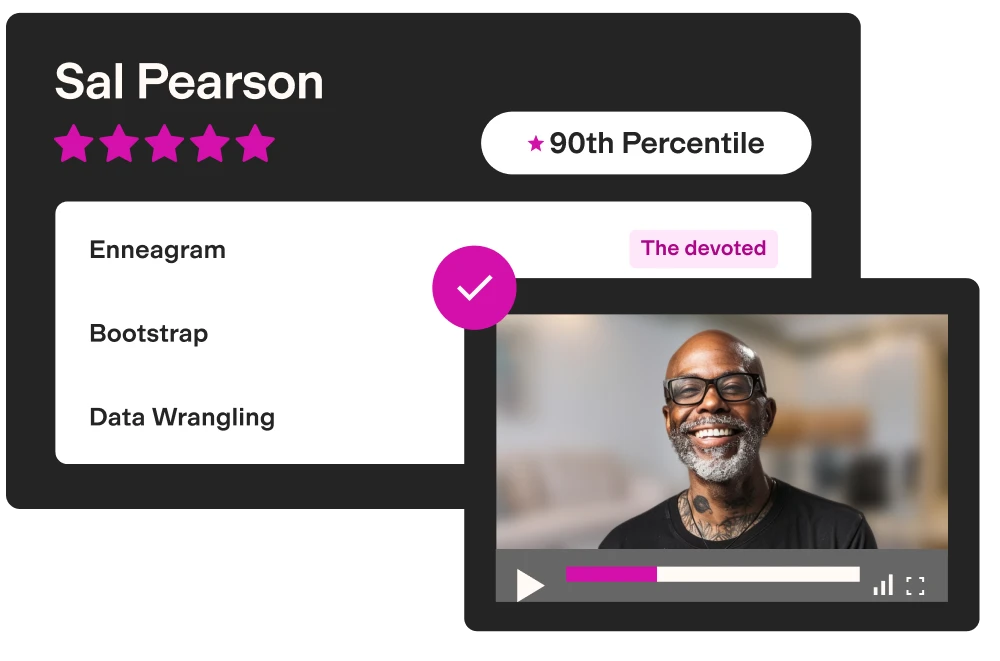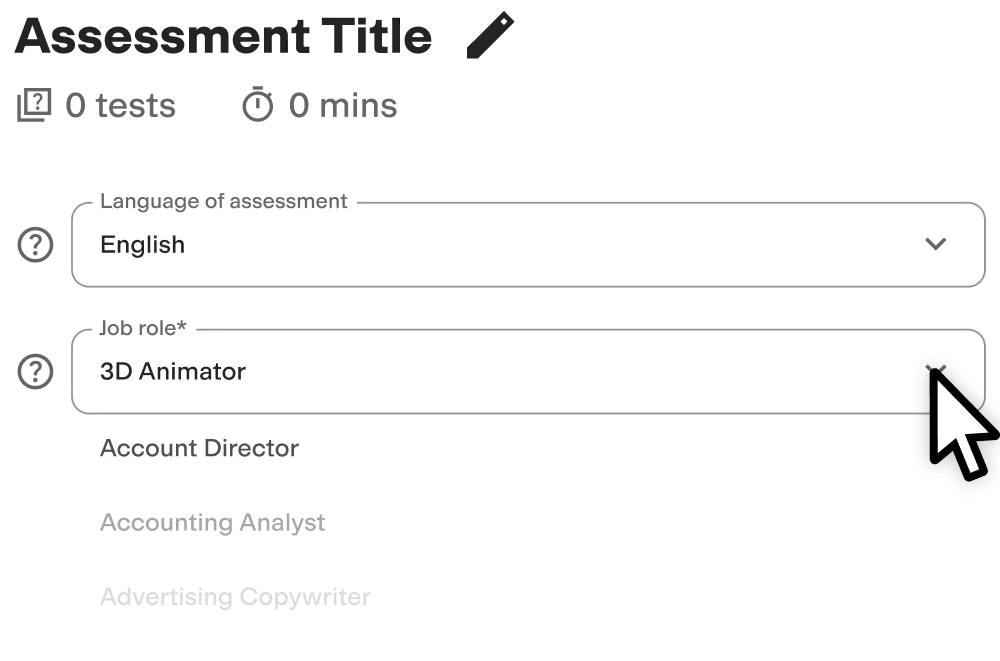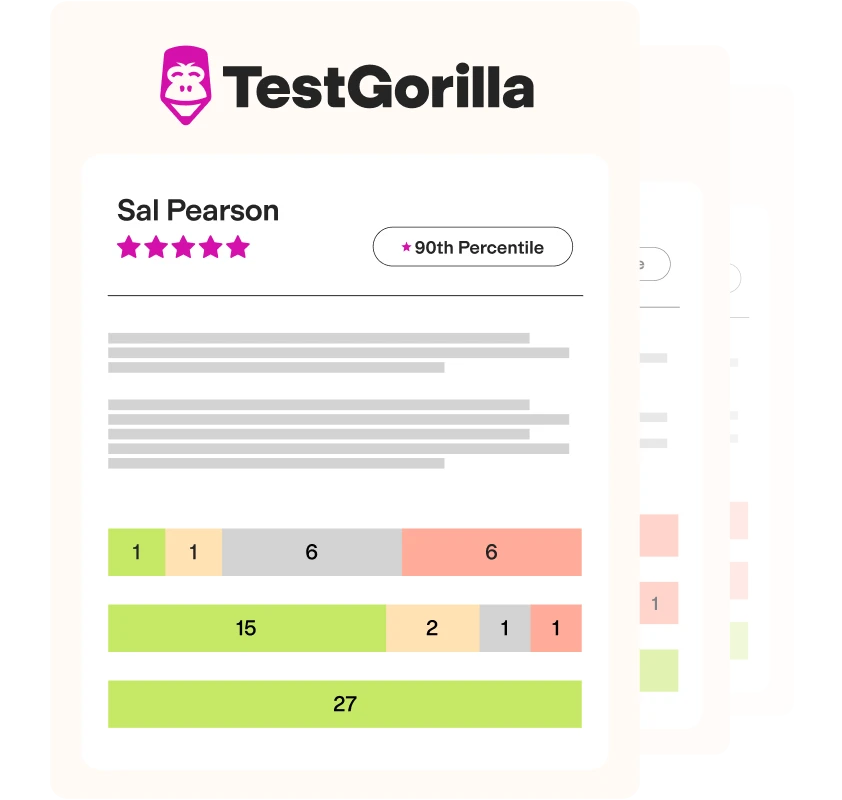Customer Service (Multimedia) test
Summary of the Customer Service (Multimedia) test
This multimedia Customer Service test evaluates candidates’ ability to interact appropriately and apply appropriate solutions. It will help you hire experts who enhance your operations by improving customer satisfaction and avoiding negative impressions.
Covered skills
Understanding customer needs
Customer communication
Customer service technique
Customer service operations
Use the Customer Service (Multimedia) test to hire
Customer service representatives and managers, call center agents, help desk specialists, customer success managers, client relationship managers, retail professionals, B2B salespeople, social media managers, user experience (UX) researchers, and any other role that involves front-line interaction with your customers
About the Customer Service (Multimedia) test
Hiring candidates with exceptional customer service skills helps drive customer loyalty, increase satisfaction and retention rates, leading to higher revenue and brand reputation.
This multimedia Customer Service test evaluates candidates’ abilities to understand customer inquiries, identify root causes, interact with empathy and care, determine accurate and efficient solutions, and avoid negative impressions. It also tests candidates’ knowledge of how to enhance the efficiency of your customer service team’s operations by communicating clearly, analyzing relevant data, and implementing improved systems.
This Customer Service screening test will help you identify customer service representatives, agents, and managers who can deliver effective and efficient solutions while maintaining a positive attitude and enhancing team performance. Successful candidates will provide excellent customer service, maintain customer satisfaction, and contribute to the growth and success of your business.
This test is suitable for hiring customer service representatives, call center agents, and other customer-facing roles. The test features a combination of video-based and text-based questions.
The test is made by a subject-matter expert
TestGorilla’s tests are created by subject matter experts. We assess potential subject-matter experts based on their knowledge, ability, and reputation.Before being published, each test is peer-reviewed by another expert, then calibrated using hundreds of test takers with relevant experience in the subject.
Our feedback mechanisms and unique algorithms allow our subject-matter experts to constantly improve their tests.
Katrina S.
Katrina’s track record of achieving operational excellence as a customer service manager is supported by four pillars: team building, partnership, strategic planning, and cultural understanding. She has employed this winning formula in the delivery of numerous large-scale strategic initiatives over the past 10 years.
Highly motivated by successful outcomes, Katrina uses superior organizational skills, strong multi-tasking abilities, and crystal-clear communication to lead and inspire her team.
Reliability: Cronbach’s alpha coefficient = .64
Face validity: Candidates rated this test as accurately measuring their skills (average score of 4.4 out of 5.00).
Criterion-related validity: Candidates with higher scores on this test received higher average ratings from the hiring team during the selection process (r = .09).
For an in-depth look at interpreting test results, please take a look at our Science series articles: How to interpret test fact sheets (part 1): Reliability, and How to interpret test fact sheets (part 2): Validity.
For an explanation of the various terms, please refer to our Science glossary.
Reliability and validity | Sufficient data available | Analyses and checks conducted | Outcome |
|---|---|---|---|
Reliability | ✔ | ✔ | Acceptable |
Content validity | ✔ | ✔ | Acceptable |
Face validity | ✔ | ✔ | Acceptable |
Construct validity | ✔ | ✔ | Acceptable |
Criterion-related validity | ✔ | ✔ | Acceptable |
Group differences | |||
Age differences | Pending | Pending | Pending |
Gender differences | ✔ | ✔ | Acceptable |
Ethnicity differences | Pending | Pending | Pending |
Use TestGorilla to hire the best faster, easier and bias-free
Our screening tests identify the best candidates and make your hiring decisions faster, easier, and bias-free.
Create high-quality assessments, fast
Building assessments is a breeze with TestGorilla. Get started with these simple steps.
Why are customer service skills important to employers?
Customer service skills are important to employers because all customers expect a basic level of service from your customer service team as a requirement for using your product or service.
Hiring the wrong people and falling below this benchmark negatively affects your company’s customer retention, loyalty, sales, profits, and reputation.
By contrast, having a support team with customer service that excels builds connections with customers, helps you retain customers for longer due to increased customer loyalty, boosts your business’s reputation, and leads to increased referrals.
A good customer care assessment is the first step to accessing these benefits – and avoiding the pitfalls of poor customer care. TestGorilla’s Customer Service assessment lets you see how test candidates respond to lifelike customer service dilemmas.
For example, TreviPay, a global B2B payments company, uses our skills tests to assess its candidates’ customer service abilities, leading it to conduct multiple assessments in parallel and speed up its recruitment process significantly.
4 customer service competencies to look for
Our Customer Service test questions evaluate applicants for four key customer service competencies:
Understanding customer needs: Jobseekers should have the interpersonal skills to listen to customer queries and understand the underlying need, for example, when a customer simply needs to be listened to about an issue versus needing an urgent solution.
Customer communication: Candidates can communicate clearly and professionally, both verbally and in writing, for example, on social media.
Customer service techniques: They can successfully follow best practices for customer service professionals – for example, using the hearing, empathizing, apologizing, resolving, and diagnosing (HEARD) technique to solve customers’ issues.
Customer service operations: Applicants have a strong understanding of their role and all the organization's processes and actions to support customers, from customer service chatbots to client success teams.
What job roles can you hire with our Customer Service test?
Although this test is specifically designed for high-volume customer service roles, it can also be used when screening for any role that requires workers to interact closely with customers and solve their issues.
Here are some examples of roles you can hire for with our Customer Service aptitude test:
Customer service representatives and managers turn their customer support skills into ways to assist clients and improve their customer experience
Call center agents must empathetically help customers who experience issues with the company’s products or services by phone
Help desk specialists give employees immediate support by troubleshooting computer hardware and software issues and offering general IT assistance
Customer success managers use exceptional customer service skills to develop a good customer experience and support their company’s reputation
Client relationship managers need to escalate complaints and feedback, meet with customers to alleviate their concerns, and resolve issues
Retail professionals provide customer service to shoppers to complete sales and effectively promote their products
B2B salespeople use customer support skills to understand the problems that could cause potential clients to switch to your product or service and manage their sales journey
Social media managers take advantage of customer support skills to respond to customer queries and complaints through social media channels.
User experience (UX) researchers apply customer service skills to get useful customer information during the research process.
Create a multi-measure assessment: 4 tests to pair with the Customer Service test
To thoroughly understand your applicants and their strengths, you can’t administer one test and call it a day. Instead, you should use our multi-measure assessment builder and simultaneously pair the Customer Support skills assessment with four more tests.
This screening method is effective because you create a well-rounded assessment that includes soft skills, role-specific skills, personality traits, language ability, and situational judgment.
Here are four tests you can combine with our Customer Service test to hire the best customer service specialists:
Communication test: Assess how well applicants express themselves and your company’s message using professional etiquette and active listening – an essential addition to any customer care screening process
English C1 test: Establish that international candidates can communicate fluently in English during customer interactions, avoiding misunderstandings with clients and colleagues
Retail Sales test: Examine test takers’ ability to build strong relationships with customers in a retail environment, show a positive attitude, and provide excellent customer service
Numerical Reasoning test: Evaluate candidates’ skills to process numerical information, for instance, doing addition, subtraction, and division, when offering customer support
Note: This example assessment focuses on customer service and retail employees. If you’re hiring for a different role (like a B2B salesperson), please replace the Retail Sales test with a more suitable role-specific skills test to ensure your candidates possess the right abilities.
For the best results, you can gauge the benefits of using the Customer Service test and other talent assessments, regardless of the size and hiring volume of your company, with our recruitment ROI calculator.
FAQs
View a sample report
The Customer Service (Multimedia) test will be included in a PDF report along with the other tests from your assessment. You can easily download and share this report with colleagues and candidates.







